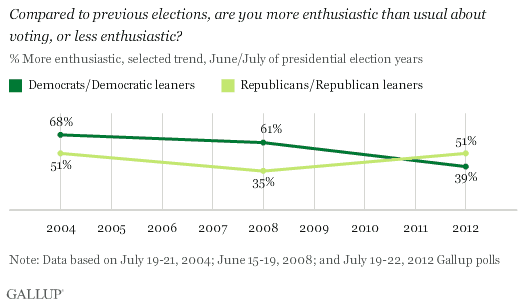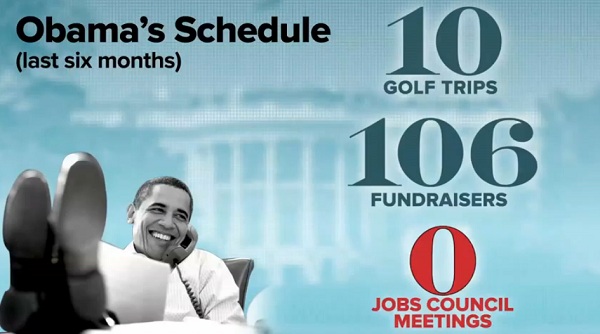-
Does Democrat Voter Enthusiasm Spell Trouble for Obama?
 Yes, according to the latest Gallup Poll.
Yes, according to the latest Gallup Poll.Democrats are significantly less likely now (39%) than they were in the summers of 2004 and 2008 to say they are “more enthusiastic about voting than usual” in the coming presidential election. Republicans are more enthusiastic now than in 2008, and the same as in 2004.
These results are based on a July 19-22 USA Today/Gallup poll. They suggest a shift in Republicans’ and Democrats’ orientation to voting in the coming presidential election compared with the last two, with Republicans expressing more voting enthusiasm. The current 51% to 39% Republican advantage in voter enthusiasm is slightly larger than the 53% to 45% GOP advantage Gallup measured in February of this year.
The voting enthusiasm measure gives a sense of Americans’ motivation to turn out and vote but probably also their expectations of their preferred party’s chances of winning. Thus, the Republican advantage may indicate a greater likelihood of voting among Republicans but also greater optimism about a Republican victory than was the case in 2008. In turn, Democrats are probably less optimistic about their chances of winning than they were in 2008.
Can you not feel a sense in a change of momentum in the Obama re-election campaign and the left-wing dominated media about Democratic Party prospects?
In 2004 and 2006, the LEFT was determined and driven to beat Bush and the GOP. This year it is ho hum. This indifference is reflected in the polls.
Republicans vote with greater frequency than Democrats anyway. Should Democrats fail to show up to the polls to support Obama in the key battleground states, the President will be toast.
With voter enthusiasm down significantly from 2004 and 2008 levels, it is reasonable to expect that turnout will be lower this presidential election than in the last two elections, both of which had above-average turnout from a historical perspective.
Republicans’ greater enthusiasm about voting is a troubling sign for the Obama campaign, especially given the fact that registered voters are essentially tied in their presidential voting preferences and that Republicans historically vote at higher rates than Democrats do.
-
Day By Day July 23, 2012 – Film Flam

Day By Day by Chris MuirChris, the Obama Presidential Campaign is, after their appearance in Aurora, Colorado, is now back to normal – raising campaign cash in San Francisco.But, then again, so is Mitt Romney.
POLS go where the money is.
Pretty sick, no?
-
Video: President Obama Has A Lot on His Plate
 President Obama obviously is a busy man.
President Obama obviously is a busy man.But, not meeting with his Jobs Council with unemployment so high.
Really?
The video embedded below ridicules the President’s busy schedule:
-
Video: President Obama You Are Killing Us Out There
 In this hard-hitting Romney campaign video, the GOP Presidential contender asks the question:
In this hard-hitting Romney campaign video, the GOP Presidential contender asks the question:- Small businesses are the lifeblood of our economy.
- But President Obama’s comments last week show that he just doesn’t understand who the real job creators are.
- How can he help small businesses when he doesn’t even recognize their value?
The Obama campaign may find the Roanoke comments, which were done off-teleprompter, the Waterloo of the President’s re-election campaign.
Here is the video, embedded below:
-
Mitt Romney Pushes Back Against Obama Insults to Small Business Owners
Republican presidential candidate, former Massachusetts Gov. Mitt Romney gestures during a campaign event at Horizontal Wireline Services on Tuesday, July 17, 2012 in Irwin, Pennsylvania
Mitt Romney is starting to show some fight and is striking back at what some in the media are calling President Obama’s Roanoke gaffe.
In an attempt to change the subject from his tax returns and his tenure at the helm of Bain Capital, Republican presidential candidate Mitt Romney intensified his own rhetoric on Tuesday and called President Obama’s recent comments about small business “insulting to every entrepreneur, every innovator in America.”
Romney was referring to Obama’s remark on Friday at a campaign event in Roanoke, Va., where he argued that successful businesses happened not only because of individual achievement, but because people utilized parts of the public system, such as teachers, the Internet, and roads and bridges. Obama said, “If you’ve got a business, you didn’t build that. Somebody else made that happen.”
While agreeing that government-paid employees and infrastructure are needed, Romney said that those services were not responsible for the success of new business.
“The taxpayers pay for government,” Romney said to applause from a fired-up crowd of several hundred people at a gas and oil equipment company. “It’s not like government just provides those to all of us and we say, ‘Oh thank you, Government, for doing those things.’ No, in fact we pay for them and we benefit from them and we appreciate the work that they do and the sacrifices that are done by people who work in government. But they did not build this business.”
Romney broadened his argument to suggest that Obama’s logic demeaned those who were trying to better themselves.
“People who reach to try and bring themselves up, the president would say, ‘Well you didn’t do that,’ ” Romney said. “You couldn’t have gotten to school without the roads the government built for you, and you couldn’t have gone to school without teachers, so you’re not responsible for that success.’ Look, President Obama attacks success and therefore under President Obama we have less success, and I will change that.”
I am positive that Romney’s political shop has told him to show some heat and some passion. President Obama threw open an opportunity and Romney is taking it.
Many conservatives are saying, it is about time.
Here is the video, embedded below:
-
President 2012 Poll Watch: Obama 48% Vs. Romney 46%
 In the battle for the White House, President Barack Obama and Mitt Romney are locked in a close contest nationally. According to this McClatchy-Marist Poll, 48% of U.S. registered voters including those who are undecided yet leaning toward a candidate support President Obama compared with 46% for Romney. Less than one percent backs another candidate, and 6% are undecided. “The race was close yesterday, it’s close today, and may even be close on Election Day,” says Dr. Lee M. Miringoff, Director of The Marist College Institute for Public Opinion. “You need to look no farther than the president’s approval rating to see how divided the electorate is.”Not a good sign for Team Obama as they have been spending heavily with the Bain advertising attacks against Romney.This race will go down to the wire in key battleground states, especially Virginia and Nevada.
In the battle for the White House, President Barack Obama and Mitt Romney are locked in a close contest nationally. According to this McClatchy-Marist Poll, 48% of U.S. registered voters including those who are undecided yet leaning toward a candidate support President Obama compared with 46% for Romney. Less than one percent backs another candidate, and 6% are undecided. “The race was close yesterday, it’s close today, and may even be close on Election Day,” says Dr. Lee M. Miringoff, Director of The Marist College Institute for Public Opinion. “You need to look no farther than the president’s approval rating to see how divided the electorate is.”Not a good sign for Team Obama as they have been spending heavily with the Bain advertising attacks against Romney.This race will go down to the wire in key battleground states, especially Virginia and Nevada. -
President 2012 Poll Watch: Obama 47% Vs. Romney 47%

According to the latest Washington Post-ABC News poll.
“The lack of movement underscores intense polarization — about nine in 10 Republicans back Romney, and a similar proportion of Democrats support Obama — and a relatively small percentage of voters say there is a ‘good chance’ that they could change their minds before November. At this point, 74% of all voters are ‘definitely’ supporting Obama or Romney, and 12% say it is unlikely that they will switch from one to the other, making the race a settled issue for nearly nine in 10 voters.”
In another poll, Romney has taken the national lead, albeit a slight one.
Mitt Romney continues to hold a whisker-thin 1-percentage-point lead over President Obama in a head-to-head election match-up, but the former Massachusetts governor is eating into the president’s air of inevitability, according to the latest The Washington Times/JZ Analytics poll released Monday night.
The poll found Mr. Romney leading 43 percent to 42 percent — about the same margin as the poll in May, but Mr. Obama slipped on several key measures, including fewer voters who say they expect him to win, and fewer who say they are voting for him because he’s the best candidate.
The White House can read the polls and this is why the President has been attacking Romney so early in the race. But, will it be effective?
I doubt it.
The country is polarized and the election will come down to Ohio, Virginia and Nevada. Numerous ads have already been playing in those states and those folks must be sick of them already.
If the economy improves, President Obama will win re-election. If it doesn’t, he won’t.
Quite simple really.
-
Swing States Poll Watch: Obama 47% Vs. Romney 45%
 The Obama and Romney campaigns are already in full advertising mode – in a race that is virtually tied.
The Obama and Romney campaigns are already in full advertising mode – in a race that is virtually tied.In the 12 battleground states, the race is all but tied. Obama leads Romney 47%-45% among 1,200 registered voters in the poll June 22-29 — a tick closer than Obama’s 48%-44% lead among 2,404 voters in the rest of the USA over the same period.
The swing states survey focuses on a dozen states that aren’t firmly aligned with either Democrats or Republicans. That puts them in a position to tip the outcome in the Electoral College. The states: Colorado, Florida, Iowa, Michigan, Nevada, New Hampshire, New Mexico, North Carolina, Ohio, Pennsylvania, Virginia and Wisconsin.
The candidates expend enormous time and effort raising money in such cities as New York, Los Angeles and Houston so they can then spend most of that money on ads in such media markets as Colorado Springs, Orlando and Richmond, Va.
The ad wars in just a few states, rather than policy positions will decide the Presidency.
Remember the Electoral College decides the race and again, here is my prediction for November:

-
Romney Now Leads Obama Among Middle Income Voters
According to the latest Obama vs. Romney Gallup Presidential Poll.
Mitt Romney currently has a 49% to 45% edge over Barack Obama among middle-income voters, those whose annual household income is between $36,000 and $89,999. Romney has the same lead among upper-income voters, while Obama maintains a wide advantage among lower-income voters.
The results are based on Gallup Daily tracking of 2012 election preferences by demographic group, including more than 9,000 interviews with registered voters conducted between May 14 and June 3. During this period, Obama and Romney were tied at 46% among all registered voters.
Voting preferences by income group have been fairly well-established since Gallup began tracking the general election on April 11. Obama’s lead over Romney among low-income voters has ranged between 13 and 16 percentage points in each of the three-week rolling averages of the vote by demographic group that Gallup has reported since late April. Meanwhile, Romney’s edge among middle-income voters has been between four and seven points, and among upper-income voters, between four and six points.
Romney, the wealthy former head of Bain Capital, has slightly greater appeal to the highest-income voters in Gallup’s data, those making $180,000 or more in annual income. This group has shown a 53% to 42% preference for Romney since mid-April, compared with 50% to 45% for Romney among those earning between $90,000 and $179,999.
Again, this is good news for Mitt Romney and the Republican Party.
If Obama loses the middle income folks, he is not going to be re-elected.The fact is there is greater voter participation among middle income voters than lower income ones.
It appears that Obama’s appeal is based more upon race, than winning the economic argument of “sharing the wealth around.”
Obama’s large lead among low-income voters overall is due to two factors. First, as the prior table shows, lower-income nonwhites prefer Obama to Romney by a 68-point margin, compared with smaller 55-point and 52-point margins among middle- and upper-income nonwhites, respectively. At the same time, Romney has a smaller lead among lower-income white voters (10 points) than among middle- (19 points) or upper-income white voters (14 points).
Second, and perhaps more importantly, nonwhites fall disproportionately into the lower-income group. Nearly half of nonwhites, 49%, report annual household incomes of less than $36,000. And 38% of those in the lower-income group are nonwhite, compared with 22% of those in the middle-income group and 17% in the upper-income group.
But, most importantly, Mitt Romney is leading among middle income and independent voters, a key demographic.
Though Romney’s edge among middle-income voters is similar to his lead among upper-income voters, in certain subgroups of middle-income voters he performs especially well. That includes middle-income independent voters, who right now prefer Romney by an eight-point margin, 48% to 40%. Obama leads among lower-income independents, and the two are tied among upper-income independents.
All in all, a good poll for Mitt Romney early in the race.
No wonder the odds makers at InTrade.com have seen Obama crater in recent trading.
-
Mitt Romney Hits President Obama on Solyndra
Mitt Romney’s new web video: Symbol of Failure
Mitt Romney has seems to have struck a cord in highlighting the President’s economic failures.
And, Solyndra and Obama’s crony capitalism is certainly a symbol.

